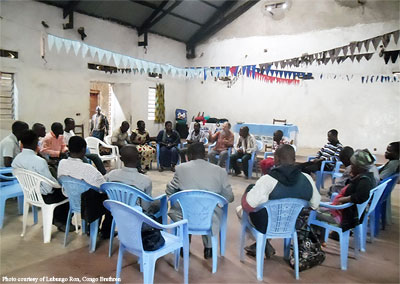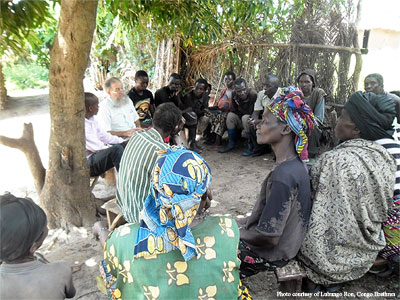By Lucas Kauffman

Cliff Kindy leads peace training for the Congo Brethren in the DRC
Church of the Brethren member Cliff Kindy, who also has worked with Christian Peacemaker Teams (CPT), visited Brethren in the Democratic Republic of Congo from Dec. 14-23. This was not Kindy’s first visit to the Congo, where he has traveled with CPT. During the CPT trip he had been “impressed with the way individuals and peace and justice groups were re-taking the initiative from the actors of violence, when that meant risking their lives daily.”
This trip was made at the request of pastor Ron Lubungo and the Brethren in the DRC. Jay Wittmeyer, executive director of Global Mission and Service for the Church of the Brethren, expanded the work of this visit and helped provide funding, Kindy said.
Kindy accomplished two major tasks, leading a nonviolent peacemaking training for a mostly Brethren group, and helping to build relationships with the Brethren in the DRC. “The training was a major three-day focus of my nine days,” said Kindy. “It was a group of 24 people from 5 different denominations and 5 ethnic groups. I was impressed with the depth of their engagement with the themes and activities throughout the training. Their lives are surrounded with violence, which is the reason they are searching for tools to deal with that influence in their lives.”
The trip also included being part of worship with three Brethren congregations. “Pastor Lubungo asked me to preach at one of those,” Kindy said “One evening, eight church leaders spend several hours asking questions about the Church of the Brethren in the United States and sharing some of the issues facing their church.”
“I also had the opportunity to meet with Twa [pygmy] groups displaced by attacks in their forest homelands,” Kindy added. “The DRC Brethren have been doing agricultural, peace, and development work with the Twa.”

A gathering of Twa people during Cliff Kindy’s visit to the Democratic Republic of the Congo, in December 2013
Kindy was able to see and experience a lot of different things during his travel. “The setting in a highland breadbasket, surrounded by mountain chains to the east and west of the lake, adds a rugged quality to the folks who populate this region,” he commented. “The wisdom and experience of peace builders who have returned from safety in a Tanzanian refugee camp to respond to a call to be peacemakers in their violence-plagued home communities adds a special daring richness to already beautiful Christians.”
Kindy did run into a little bit of trouble while in the Congo. “An armed group stopped our vehicle at a checkpoint,” he reported. He also saw armed people on the streets and roads, “like the Mai Mai nationalist fighters I rode by on a motorbike one afternoon,” he said. “The six million deaths in the DRC over the last two decades make it clear that my experience of comparable safety is not the only way things happen when one meets any of the dozens of different armed groups that plague the South Kivu province.”
A new Brethren group
In the DRC, there are eight Brethren congregations, with about 100 members each, and each has its own pastor. “They hope that biblical and theological training for pastors might be part of a deepening relationship with the Church of the Brethren in the United States, and connections with the Church of the Brethren in Nigeria, Haiti, and India,” said Kindy.
Children and youth were primary features in the worship services he attended. “The Brethren in Ngovi had three choirs and the children too young to join the choirs often mouthed the words and copied the motions of older siblings who sang or played drums and guitar.”
Kindy visited a Brethren congregation in Makabola that was the site of a 1,800-person massacre in the village in 1998. “The trauma from that disaster is similar to what underlies any relationships in the DRC,” he said. “Additional trauma workshops and processes for healing that are ongoing can be similar to what the United States veterans from Iraq and Afghanistan need for healing from their psychological war wounds.”
Life can be hard for Christian sisters and brothers in the Congo. “Their country is at the bottom of the scale in average yearly income,” Kindy noted. “One day I had lunch at 2 p.m. and the next meal the following day at 4 p.m. I suspect that may not be unusual. As the guest, I slept in a bed with mosquito net, small table, chair, and battery operated lamp in my own room at the Brethren Center in Ngovi. The others with me were on the floor without the other accoutrements. When we traveled on the road outside the city of Uvira, the average speed was about 20 miles per hour unless we had a straightaway without potholes, rocks, and lakes to dodge where we might race up to 30 miles per hour for 40 feet. Kinshasa, the capital, is on the far west side of the DRC, so few infrastructure works get shared with the east, even though many of the mineral lodes of this very resource-rich country are in the east.”
Hopes for nonviolent peacemaking
Kindy hopes that the three regional groups that formed quickly out of the nonviolence training will engage quickly in peace building efforts. “This group has the potential to far surpass what CPT itself has done over the last 26 years,” he said, “because their lives are at stake in the effort to replace violence with nonviolent peacemaking in home, community, and country. They have close connections with neighboring countries and this spirit could spread rapidly.
“With the DRC Brethren, I feel the depth and energy of the Spirit in the worship and vision of members and leaders,” he said. “The youthfulness and investment of self reminds me of what I have seen in the Haitian Church of the Brethren, the Brethren in Brazil, and during the take-off times of the Church of the Brethren in Puerto Rico.
“The focus of the DRC Brethren on peacemaking is an essential aspect of Christian discipleship in our world today,” he added. “Maybe that focus can be re-seeded with a new hybrid vigor among those of us in the United States.”
A participant in the nonviolence training shared frankly at the end of the three days: “Cliff, the DRC does not manufacture or sell guns. Your country is the world’s largest arms supplier. Your corporations maintain active fighting groups to access our mineral wealth for your benefit. We bear the brunt of that economic injustice and deadly violence. The work of peacemaking needs to be done in your country.”
“Yes,” Kindy responded. “If Jesus’ prayer is to have meaning in our world, Christians in the United States need to be even more serious about the demands of discipleship than our sisters and brothers in the Democratic Republic of the Congo.”
— Lucas Kauffman pulled together this article through an interview with Cliff Kindy, and reports Kindy wrote about his trip. Kauffman is a senior at Manchester University in N. Manchester, Ind., and a January term intern with the Church of the Brethren News Services.